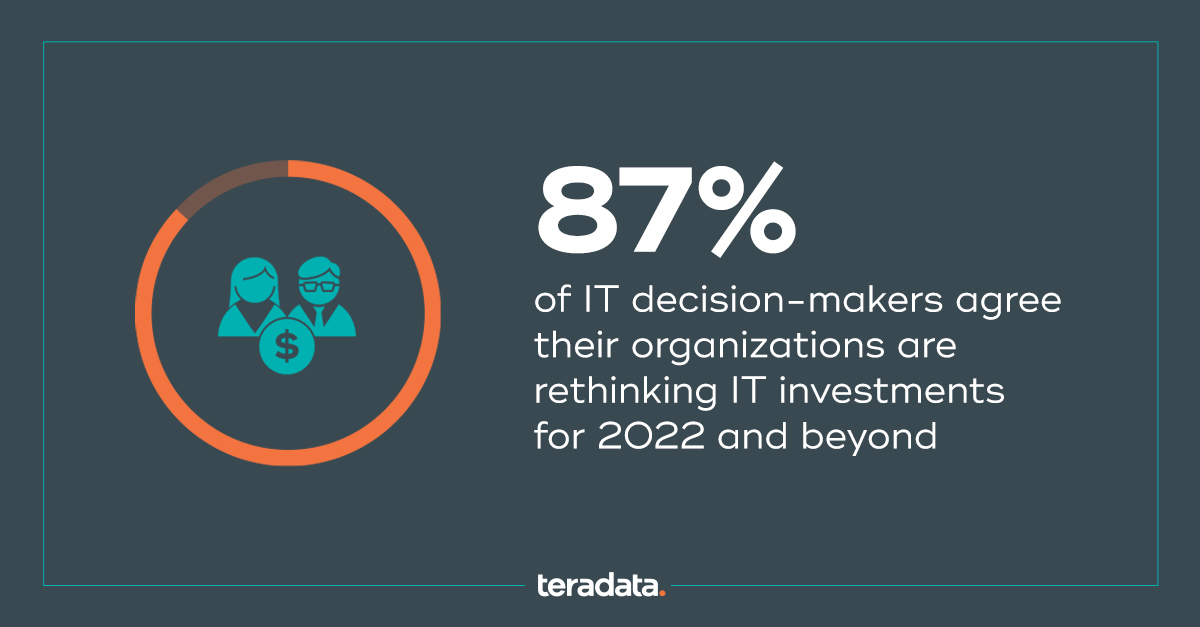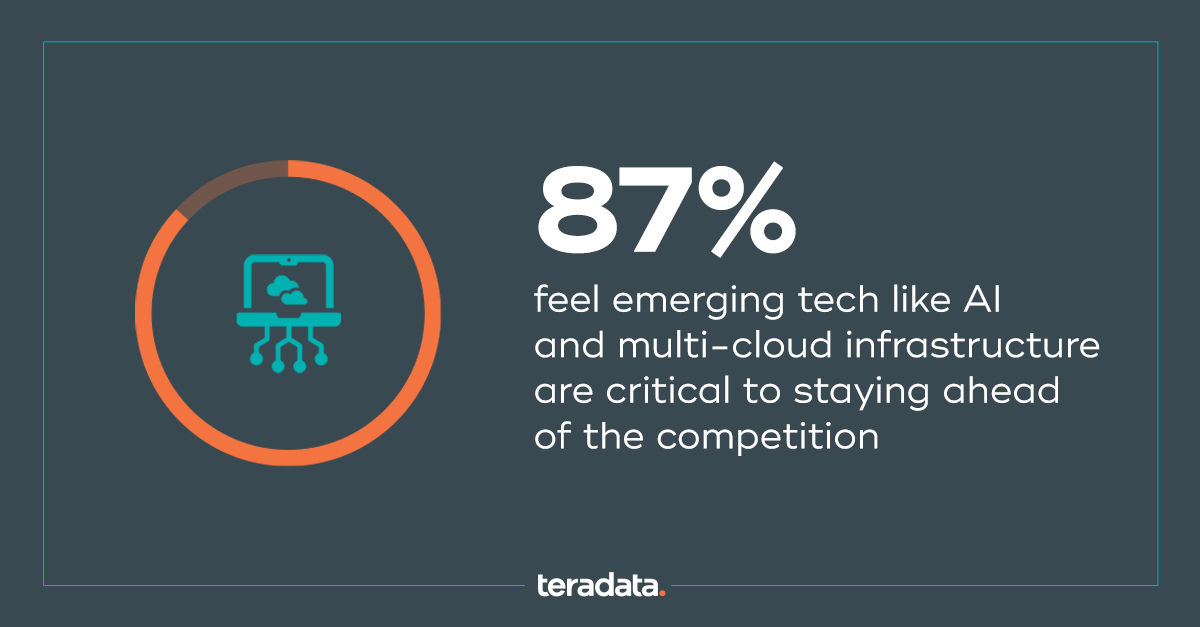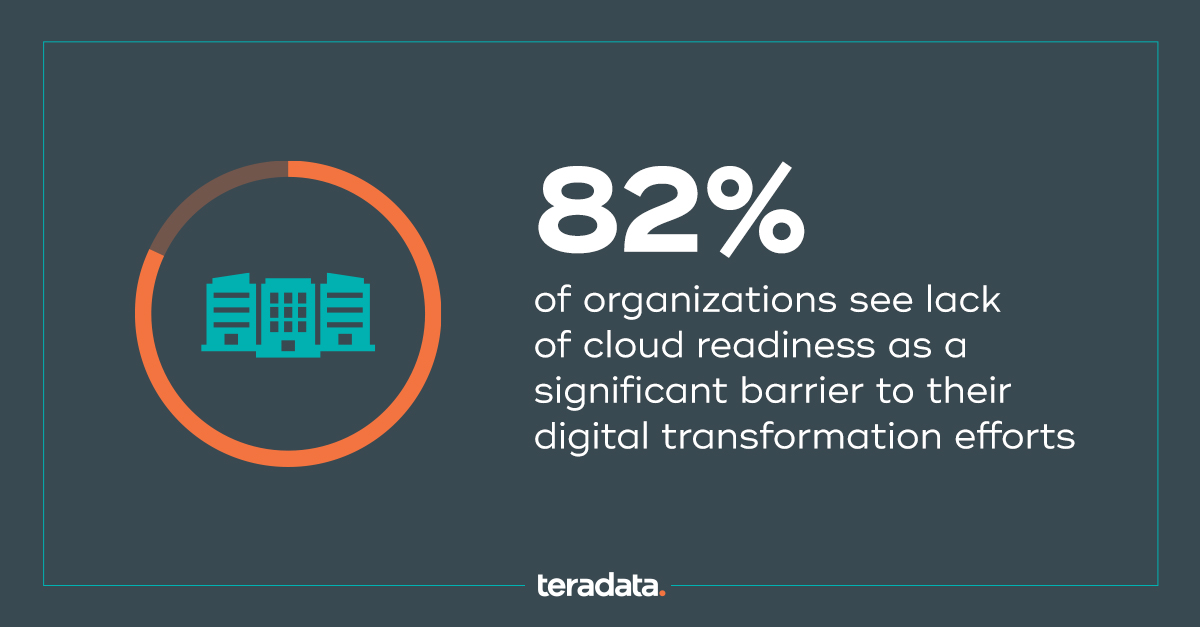Following a year that established digital transformation as the "continuous transformation," rather than just a passing fad, enterprises across the globe are now actively reevaluating their 2022 IT investments with an eye towards enhancing the pillars of digitization – cloud infrastructures, data management, and emergent technologies such as automation. The primary motivators for large organizations are market changes, an increasing appreciation for the potential positive impacts of new technologies, unlocking business value and concerns about lagging behind faster-moving competitors.
Those are among the key
findings of our latest annual global industry survey, compiled during August 2021 in partnership with independent market research firm Vanson Bourne. Canvassing organizations spanning nine countries, our survey reveals that the vast majority of respondents are contemplating long-term, data-focused investments to address changing market conditions, notably including consumer behaviors.
2022 IT Investments Will Be Motivated By 2021 Market Volatility
Although the effects of the COVID-19 pandemic were expected to taper off in 2021, both the virus and its economic impacts have been longer-lasting, forcing organizations to modify their 2022 and future plans.
According to our survey:
- 87% of companies report rethinking IT investments for 2022 and beyond, mainly due to significant recent shifts in consumer spending and market uncertainty.

- 93% of respondents agreed that when re-evaluating their IT investments, modernizing cloudarchitecture, improving data management, and analytics were among the top investment areas to accelerate their digital transformation efforts.
- 89% of IT decision-makers said their organizations should increasingly prioritize data governance/responsibility initiatives, though 50% reported that their organizations had no plans to increase data governance investments at this time.
Emerging Technologies Are Becoming Priorities, Everywhere
IT leaders across the United States, Europe, and the Asia-Pacific/Japan regions widely cited emergent technologies as a top investment priority for the coming three years. Ranging from 5G and AI to IoT, edge computing, multi-cloud infrastructures, and data analytics, these technologies are expected to dramatically change how data is sensed, gathered, stored, processed, and shared, enabling adopters to rapidly extract and act upon insights from information.
Our survey revealed that:
- 90% of respondents believe that emergent technologies such as automation will have a transformational impact on their organizations in the next three years.
- 87% of IT decision-makers feel they will risk lagging behind competitors if they don’t leverage key emerging technologies such as AI and multi-cloud infrastructure.

- 3 out of 4 IT decision-makers agreed that their organizations' digital transformation efforts (or lack thereof) could be a roadblock to realizing the full benefits of key emergent technologies, such as AI and machine learning.
Cloud-Readiness Questions Are Casting Shadows On Digital Transformations
Transitioning from on-premises data management to partial or complete cloud strategies is not as easy as flipping a switch. Even IT leaders who began cloud transformations years ago are continuously recalibrating their cloud services to optimize performance and cost-efficiency. Compelled by the pandemic to move forward rather than stand still, other IT leaders are still determining when and how much their organizations will move critical data to the cloud.
- 82% of IT decision-makers expressed concerns that not being cloud-ready could be a significant barrier to accelerating their digital transformation efforts.

- 85% of respondents agreed that digital innovation strategies and transformation efforts were further compounded by significant shifts in consumer purchasing behaviors, with the greatest impact in verticals such as Retail, Distribution, and Transport (87%).
Viewed in totality, this year's survey suggests that while organizations and IT leaders have substantially recovered from a
highly disruptive 2020, the timing, depth, and breadth of digital transformations remain somewhat in flux for Teradata customers. However, the clear trend is towards heavier reliance on clouds for data storage and analytics, leveraging emerging technologies to manage growing volumes of data.
Several emergent technologies – IoT, 5G, and AI – are particularly noteworthy in this context. Whereas prior IT leaders viewed data collection as a relatively discrete task, harvesting information for on-premises processing, IoT sensors will increasingly and continuously gather vast quantities of information from both organization-controlled locations and the field. The next generation of IoT sensors will leverage the wireless flexibility and bandwidth of 5G cellular connectivity, and in some cases, customers' 5G devices will share useful data. Automations such as AI will be necessary, not optional, to process and analyze the resulting floods of data.
Collectively, these emergent technologies are changing the way IT leaders think about data management and analysis. Inbound data from thousands of wireless sensors and devices might best be processed in one or more clouds rather than on-premises servers, pushing organizations to adopt modern IT infrastructures with hybrid- or multi-cloud support. Those who rely solely on local analytics tools will need alternatives that span multiple on-premise and cloud servers to gain comprehensive insights.
As we prepare to enter 2022, becoming "cloud-ready" won't be as simple as moving applications and workflows from on-premises servers to the cloud. A larger paradigm shift is afoot in the ways data is created, warehoused, and analyzed; wise organizations will seize this opportunity to support their technical leaders as they redesign IT budgets and infrastructures to guarantee future success.
Teradata + Public Cloud = Lowest Risk, Fastest Time to Value.
About the survey:
Teradata commissioned independent market research company Vanson Bourne to conduct a quantitative research study of IT and business decision-makers in August 2021, covering organizations across the U.S., UK, France, Germany, China, Singapore, Japan, Australia, and India. Each had 3,000 or more employees and global annual revenues of more than $250 million, spanning various private or public sectors including Business and Professional Services; Financial Services; IT, Tech, and Telecoms; Retail, Distribution, and Transport; Manufacturing, and other commercial sectors. Interviews were conducted online using a rigorous multi-level screening process to ensure that only suitable candidates participated.
Hillary Ashton is the Chief Product Officer for Teradata. In this capacity, Hillary leads the global products organization, a diverse team responsible for innovation, product management, engineering and quality, ensuring that our hybrid multi-cloud platform delivers differentiated value to our customers and future customers. Her organization focuses on end-to-end oversight of all technology innovations at Teradata, including defining strategic direction for our hybrid cloud platform portfolio, engineering this strategic direction into high quality products for our customers and delivering a world-class user experience. With a strong grounding in analytics, cloud and leading-edge technologies, Hillary has proven contributions to expanding market share and increasing revenue.
Prior to Teradata, Hillary served as Executive Vice President and General Manager of PTC’s Augmented Reality (AR) business unit. In this role, she was responsible for all operational aspects of the Vuforia SaaS business and its product lines, including executive leadership and vision, strategy, product management, engineering, sales and marketing. Other roles include serving as SVP of Analytics SaaS solutions at Manthan and as Director, Customer Intelligence at SAS. In each of these roles, Hillary has contributed to expanding market share and increasing revenue.
A graduate of Franklin & Marshall College where she earned a Bachelor of Arts (BA) degree in Government, Hillary has been quoted in the press extensively and has spoken at various conference and events worldwide. In 2019 she was named to the National Diversity Council’s (NDC) annual list of the Top 50 Most Powerful Women in Technology.
View all posts by Hillary Ashton